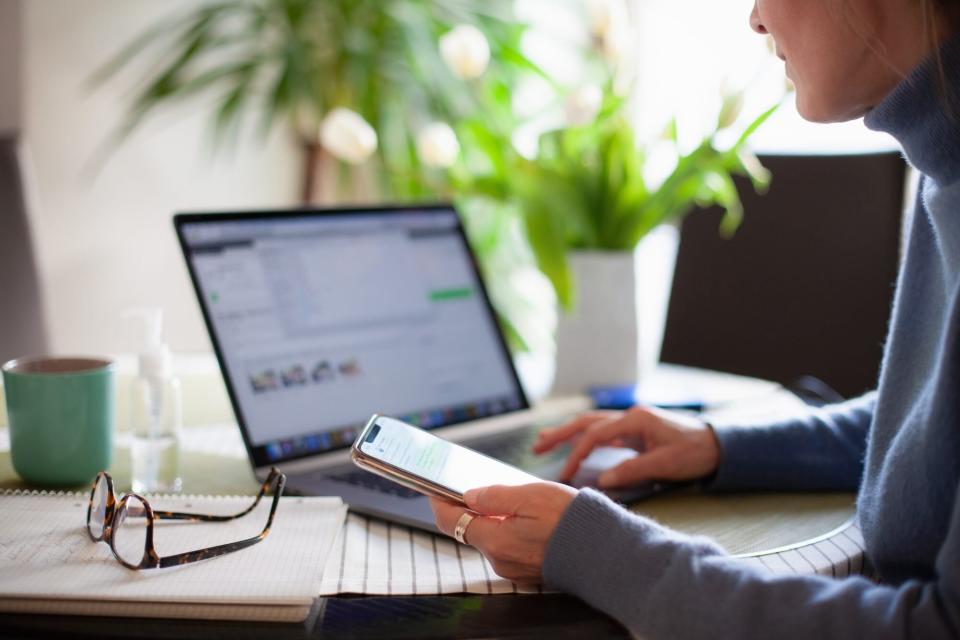Five Easy Ways to Reduce Your Personal Screen Time
One of the side effects of lockdown in quarantine is that many of us are spending even more time online than before. Work and school have both gone remote so that means additional time on the computer that can also overlap with personal time at home.
According to Justin J. Schleifer, MD, child and adolescent psychiatrist at Bradley Hospital in Providence, Rhode Island, we should be trying to limit our personal screen time as much as possible. He'd told us that one of the reasons is that we could be missing out on other aspects of our lives—in addition to eye strain from staring at screens for hours on end, effects of blue light on the skin, and the social development disruption that children experience from too much time on screens. "Children who spend most of their time on a screen is more of a concern [than when adults do the same]," Dr. Schleifer previously explained to us. "With children, there is a lot of development that they could miss out on as a result. Children who watch a lot of television could struggle with their language development or with reading social cues at school."
So, what can we do to reduce our personal screen time in our free time? Try some of these tips to re-acquaint yourself with life outside of a screen.
Related: Daily Habits to Maintain While Working from Home

Courtesy of Le Creuset
Check your usage time.
First, it's important to be aware of your screen time as it stands now. This is easy to check on your phone (Android or iOS) or your computer or tablet within general settings. Often, there's a breakdown of how much time you spend in each app and hours where that usage spikes. Consider downloading software like Qustodio or Offtime to limit your screen time by device as well as (in the case of your kids) monitor any activity on social networks, block inappropriate content, and limit games, and apps. This helps to set a baseline for improvement—just be mindful of it in the future.
Log off, disable, and unplug your devices.
As soon as your work day at home ends, turn off your computer. Put it away if it's a laptop or close the door to your office if it's a desktop computer. Then walk away from it. Just because we are working from home now does not mean that we need to be working at home all of the time. Turn off almost all notifications (except from key people like your direct peers and manager or your spouse) and, if the temptation is too high, remove social media apps from your phone. Also, set your phone to gray scale: Without all those colors, news notifications, and apps like Instagram and Facebook, it's much less interesting.
Set up a sleep schedule on your phone.
If your smartphone is also your alarm clock, you can set up a sleep schedule on your phone that has a "Do Not Disturb" setting during the hours that you intend to wind down and go to sleep. That means that text messages or phone calls, except ones you have set as emergencies, will not bother you for a set amount of time. Another option is to shut off your phone in the evenings, opt for a sunrise alarm clock and landline phone, and really unplug from your smartphone after 5 p.m.
Head outside.
Even if it's cold and snowing, put on a winter coat and boots. You don't even need to go far to appreciate the wonders of outdoors: The seasons provide plenty of opportunities to go walking in the neighborhood or hiking at a local park. Nothing is more fun than engaging the kids in outdoor crafts like sun prints, dyeing, and more. Parks also offer nice natural scenery for watching birds or other wildlife, or going for a run.
Read, take up a hobby, and learn new tactical skills.
Did you know that reading can help to reduce stress? According to 2009 research conducted by the University of Sussex, a few minutes of reading can reduce stress by 68 percent. And while we love our Kindles, we also enjoy holding a book in our hands. You can do curbside pickup at many libraries or order a few books to keep on hand from your favorite bookstore to be delivered to your house. The same goes for meditative crafts like knitting and painting, which can help you wind down after a busy day online and help you to get better sleep when you finally call it a night.

